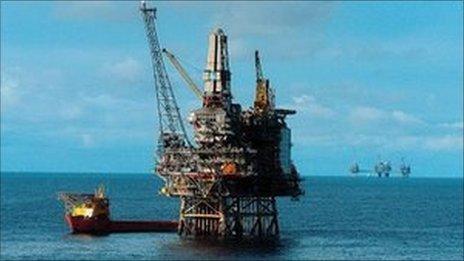Retirement planning for the North Sea
- Published

Could the oil and gas industry see you through to retirement?
If you're a young thing starting a career in oil and gas in Scotland now, what future does it offer?
According to the first minister, it should, or it could, see you through to your retirement.
Alex Salmond's optimism has been widely shared at a select gathering of the grey heads of the offshore sector. Organised by the Scottish Council Development and Industry on Tuesday, it scanned the industry's far horizons.
And held in Edinburgh, it was partly to force the Aberdeen-based network to think outside its bubble.
The upbeat mood underlines what I find increasingly from my perspective on the Scottish economy - that there can rarely have been such a gap between Aberdeen's energy sector and the rest of the country's economy.
Yes, perhaps there was in the early 1980s, but it's also a huge gap now, and shows signs of being sustained that way. With sustained sluggish growth elsewhere, the prospects for energy are likely to have a strong pull on investments, skills and hopes.
That's if prices remain high. Benchmark Brent crude is riding high on Iranian sabre-rattling right now, but the conference heard a reminder from Malcolm Webb, of Oil and Gas UK, that every decade of North Sea oil so far has seen the price crash at some point.
The one to watch is probably gas, which has been de-coupled from the oil price. That's partly through the rapid expansion of shale production in the US, and liquid natural gas becoming more easily tradable.
Over a barrel
This is also unlike other industries, in that it's constantly reminded, and reminding itself, of its limited lifespan, as resources run dry and attention/investment turns elsewhere. (By contrast, imagine a finance sector conference discussing what to do over the coming decades as money runs dry.)
So the hydrocarbon people take their future more seriously than most. And that future needs quite a lot of planning and co-ordination.
Hence, 40 years after SCDI hosted a conference in Aviemore that charted the course for the sector and the Scottish economy, this seems an appropriate moment to think about about the next 40.
Back in 1972, Shell's boss pointed out that a staggeringly humongous three billion barrels of oil had been discovered on the so-called UK Continental Shelf. But as Alex Salmond pointed out, the industry has already extracted 39bn barrels, with another 24bn barrels still under the seabed.
With some optimistic assumptions on prices (see above on that crash every decade), those barrels could have a market value of £1 trillion. And as Malcolm Webb pointed out, the 24bn barrel estimate is probably too conservative if past experience is any guide.
It's a gas
So the sector is in its middle age, it's on a declining production path, which is expected to reach negligible levels by 2052.
There's lots to be done before then; squeezing more out of hard-to-reach oil fields, many of them much smaller than in the past, and moving on to new technologies such as shale gas, renewables and decommissioning of the kit now out at sea.
One theme was the move to focus more on gas, whereas oil has dominated the Scottish sector of the North Sea.

John Pearson, from Amec, says it is hard for people to leave Aberdeen
The UK chairman of Shell argued that gas will be required to plug the UK's power gap, replacing coal, and that it shows signs of being plentiful and relatively cheap.
That's despite utility customers' recent experience. West of Shetland features some strong gas prospects.
Then, the longer-term challenge is to shape the industry's legacy.
Amec's Europe and Africa managing director of natural resources, John Pearson, said Aberdonians (and he speaks as one) are rarely given to outbursts of enthusiasm, but he is clear in his near- and long-term optimism about what that retirement planning might bring.
That legacy requires Aberdonians to think internationally, he said. Already the industry is doing so, and in a big way.
It already sells expertise to at least 107 countries. The conference was reminded of the growth of the export component of oilfield services, up to 45% of sales. Total sales have risen in the past decade or so by more than 300%, to reach nearly £16bn.
So Amec's man has the interesting question; once Scotland's lost the bits of the industry which are bound to leave as the North Sea matures, such as the exploration rigs, how to anchor the export industry in and around Aberdeen? As he put it, where do you want to be when you no longer have to be there?
And how to make that location of choice Aberdeen city and shire?
He says it's hard to recruit people into Aberdeen, but it's just as hard to persuade them to leave once they've got used to it. And it has put down deep piles in subsea expertise, with Houston, Texas the only other centre in its class.
Total wipeout
As it surveyed the future, the industry alarm bells were mainly ringing around the cost of safety regimes, the challenge of ensuring there's a skilled workforce available, and the government's tax regime.
Alex Salmond spoke up for consistency. Note that's not the same as low tax for oil and gas companies if he had the powers over taxation.
It's mainly a criticism of Westminster, which has hit offshore production three times in the past decade with big hikes, the most recent one for £2bn last March.
That still stings. It doesn't look like it's slowed up investment this year, while the oil price has kept the announcements coming.
But one contributor pointed out that future projections for investments lasting 20 to 40 years now have to factor in the risk of another big, unpredictable hit from the Treasury.
Even if it doesn't happen, the risk is quite high, and that alone can make marginal fields non-viable.
Indeed, the most startling contribution to the day's events came from Philippe Guys, managing director of Total E&P (that's exploration and production to most of us).
The French energy giant is ploughing £2.5bn into the Laggan-Tormore field west of Shetland, which has reserves of one trillion cubic feet of gas - the equivalent of 230m barrels of oil.
Asked if that project would be given the go-ahead by Total's board if it had come to them following last year's tax hike, Monsieur Guys said it would not.
With that chilling thought for Britain's energy security, balance of payments and tax revenues, no wonder the Treasury is rather keen to re-build badly-damaged bridges with the industry.
George Osborne's next Budget, on 21 March, is being eagerly anticipated, in the hope of positive signals to help keep the hydrocarbons flowing.
- Published21 February 2012
